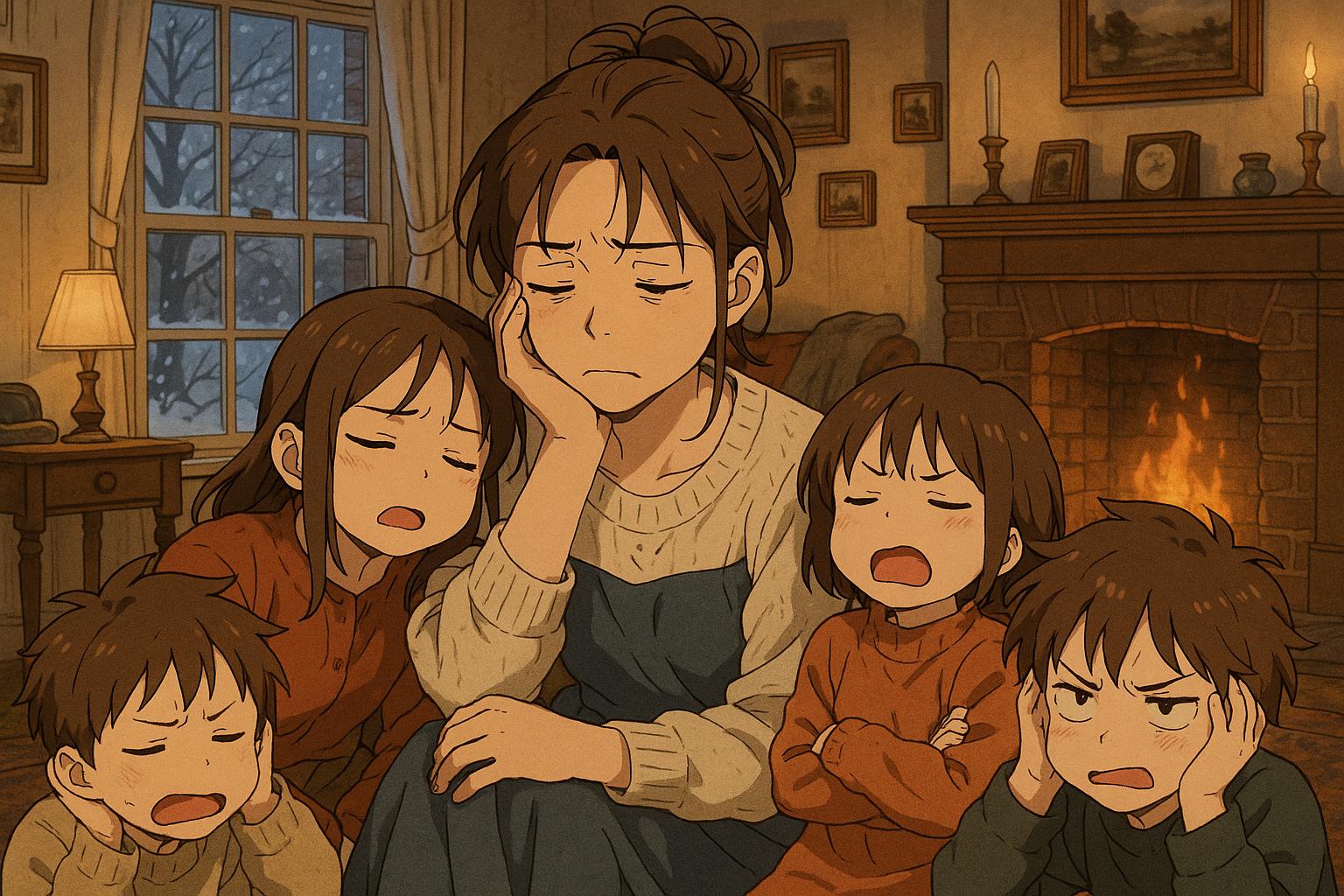The mood was distinctly heavy on that frigid Thursday evening in early January as I surveyed my four children’s faces, each reflecting a mix of exhaustion and frustration. The weight of our decision to move in with my in-laws was palpable; my youngest child clutched her tear-stained cheeks, begging, “When can we go home?” Meanwhile, my older two jostled for space at the dining table, their homework scattered among the remnants of a shared dinner. A sudden crisis arose when my youngest hinted that the shower door had broken.
The chaos stemmed from my husband Will’s conviction that moving in temporarily would be financially prudent while he oversaw renovations on our home in Wandsworth, south-west London. He assured me that our children would cherish this time with their grandparents, but the reality of our lives had quickly turned overwhelming. Despite our in-laws’ generous offer of their spacious Georgian-style house near Waterloo, the challenge of cohabiting eight people under one roof was proving daunting.
This scenario has not only become increasingly common in recent years but remains profoundly challenging. Recent surveys show that nearly a quarter of parents with adult children have welcomed them back home after they had previously moved out, with over a fifth of these returnees aged over 30. The pressures of escalating housing prices, financial instability, and the pursuit of intergenerational support, particularly in London, where one in four families now houses an adult child, are driving these trends. Many adults returning home even express improvements in their mental health, suggesting a potential benefit to this convergence of generations.
However, the prospect of living alongside in-laws often evokes a visceral reaction in others. Friends have reacted with disbelief when I share our situation, often expressing that they wouldn’t last a week under similar circumstances. The potential pitfalls of our arrangement loom large; navigating a household with divergent lifestyles and parenting styles is never straightforward, especially as an American amid English customs and traditions.
Amid the inevitable domestic turbulence—sibling squabbles, a dysfunctional internet connection due to an ill-fated upgrade attempt by Will, and a laundry list of household faux pas—there have also been unexpected moments of joy and connection. I often find myself grappling with feelings of intrusion and inadequacy yet, at the same time, witnessing the strengthening of family bonds has been truly illuminating.
During our first few days, we faced several hiccups, including my eye-widening discovery that I had unwittingly placed a silver fork in the dishwasher, resulting in a stern look from my mother-in-law. Our ongoing battle with recycling—often as intricate as a scene from a Greek tragedy—highlighted just how different our familial norms can be.
Reflecting on my previous interactions with my in-laws, I recognise how much my past shaped my sensitivities. My upbringing was vastly different from Will’s. As a child raised by a single mother, I often felt the absence of a larger familial network. Living with Will’s parents has allowed me to appreciate their dynamic, sociable nature, and it has prompted unexpected reflections on my own childhood.
Despite the chaos of our daily lives, remnants of warmth and communal joy have begun to surface. I’ve found solace in the moments where bonds are formed: Diana engaging with her grandparents over current events; Liv working on crosswords side by side with her grandmother; Stella enthusiastically learning to knit; and Ada forming a delightful reading partnership with her grandfather. Each interaction has served as a reminder of the beauty that exists within our overlapping lives, forging connections amid the challenges.
Cohabitating in this manner has also revitalised my marriage. Will’s interactions with his parents seem to brighten his demeanour, enriching his personality in ways I hadn’t anticipated. We share smiles and unspoken glances across the chaos, renewing our affection and intimacy. In this shared space, we find ourselves revisiting fragments of our youth, laughing and creating new shared experiences in a manner that feels both nostalgic and gratifying.
While our arrangement may be temporary, it has catalysed numerous insights about love, support, and the importance of family. The connection I've forged with Will’s parents, filled with small but poignant gestures of caring and interest in my work, has addressed deeper emotional needs long left unfulfilled for me since my mother’s passing. These simple exchanges—a request for help or just a wish to chat—speak volumes in a way that underlines how intertwined our lives have become.
Certainly, the shared chores and spontaneous interactions have fostered a more enjoyable family dynamic. Communication has often transcended words, nurturing a harmonious environment, albeit with navigational adjustments needed not merely for physical space but emotional boundaries.
As we prepare for our eventual return to independence, I’m acutely aware that leaving will be bittersweet. While the excitement of machine-washable cutlery and personal space beckons, the familial bonds we've cultivated during this time promise to linger. This unique experience has rocked our lives in the best way possible, proving that sometimes, when we step out of our comfort zones, the most rewarding connections can flourish in the most unexpected circumstances.
Reference Map
- Paragraph 1-3
- Paragraph 4
- Paragraph 5
- Paragraph 6-7
- Paragraph 8
- Paragraph 9
- Paragraph 10-11
- Paragraph 12-13
- Paragraph 14-15
Source: Noah Wire Services
